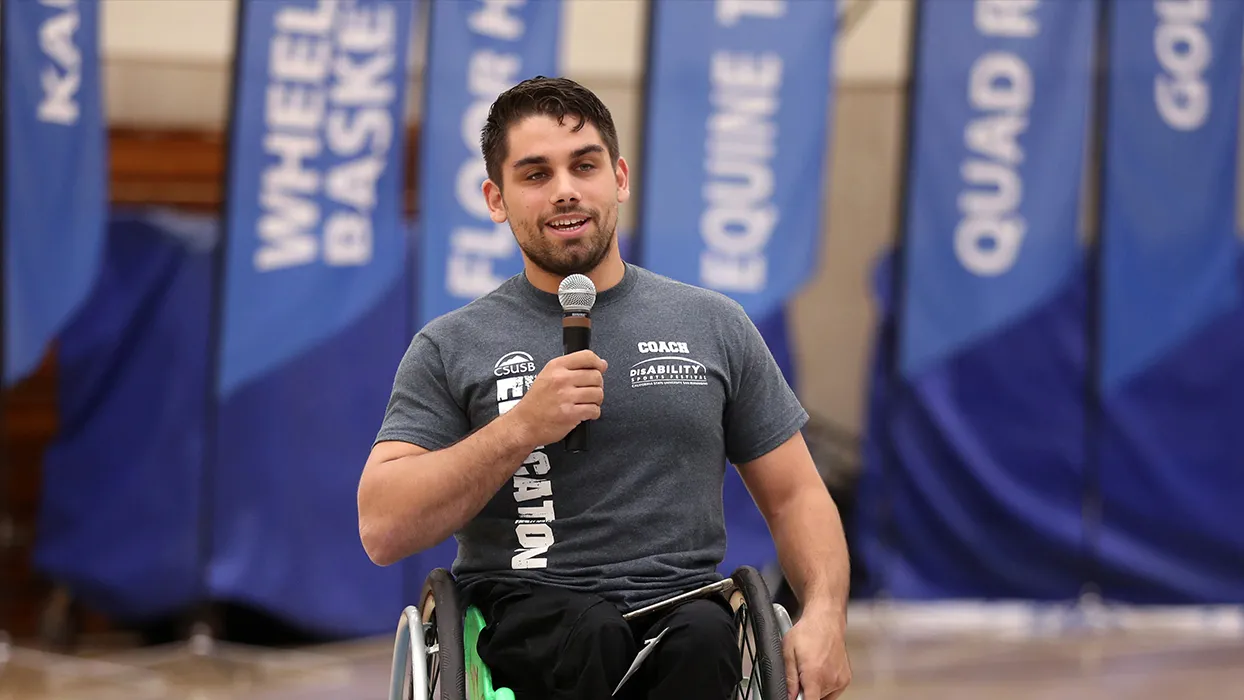Joe Gutierrez Office of Strategic Communication (909) 537-5007 joeg@csusb.edu

A wheelchair may seem like a barrier for some people. To Aaron Fotheringham, it means freedom, he told athletes, their families and others attending the 12th annual DisABILITY Sports Festival at Cal State San Bernardino. “My wheelchair has given me some pretty cool opportunities, and this one (being at the DisABILITY Sports Festival) is one of them.” Though born with spina bifida, a condition in which his spinal cord did not develop properly leaving Fotheringham without the use of his legs, as a young boy he dreamed of being a professional action sports athlete, either a skater or bicycle motocross (BMX) rider. “But for obvious reasons,” he said, “I can’t ride a bike or a skateboard; my wheels are a little bit different.”
But he did become a professional action sports athlete on a ride with wheels that are a little bit different. Nicknamed “Wheelz,” Fotheringham is a four-time professional wheelchair motocross (WCMX) champion, and tours with Nitro Circus, “the gnarliest,” he said, group of action sports athletes on skateboards, bicycles, scooters and motorcycles. Fotheringham was the guest athlete at the festival, considered one of the largest events showcasing adaptive sports, held on Oct. 6 at CSUSB. Free for participants of all abilities,ages 8 months to 84 years old, the festival drew and estimated 800 participants and their families, along with about 250 volunteers to assist them during the day. “We believe in showing the importance of health and physical activity increasing the quality of life and providing learning opportunities, while raising awareness for people living with disabilities in our community,” said Guillermo Escalante, one of the co-directors of the DisABILITY Sports Festival and a CSUSB assistant professor of kinesiology. “We believe that everyone should have the opportunity to realize that a disability is not an inability.” And Dennis Powell, a Los Angeles Dodgers alumnus (he pitched for the team in the mid-1980s), was inspired by the participants. Officially opening the festival for the second consecutive year, he told them, “You inspire us. You motivate us. The only thing you have to do, like what Aaron told us, is never quit. Never quit. You have ability. I believe in a God who does not make mistakes. Every last one of you has a purpose in your life. … Don’t let fear stop you. Don’t let that chair stop you. Don’t let anything stop you.”
With that freedom, he progressed in developing his tricks. But some of the kids at the skatepark kept asking what to him was annoying question: Can you do a backflip? Eventually he saw it as a challenge to meet, so he and his mom talked their way into training at Woodward West, an action sports camp just north of the High Desert in Tehachapi. There, he practiced doing backflips into a foam pit that gently broke his fall. Then came time to do it without the comfort of the foam pit. Fotheringham said he was able to get a good part of backward rotation of the flip in the air, but not all of it. “I landed on my head,” he said. “It was scary and it was hard, but I was getting close. Every time I crashed, it was something I could learn from. It leaves clues, you know?” Then “on July 13th, 8:57 p.m., 2006,” he nailed the flip, landing on his wheels. A video of the trick got uploaded onto YouTube by someone, and it went viral. One of the viewers was a German tire company, which reached out to Fotheringham with an offer to sponsor him and supply his chair’s tires for life. And that was the start of his professional career. He went on to do more tricks, eventually getting the chance to ride down a 55-foot Mega Ramp and do a backflip, which got him the offer to tour with Nitro Circus.
Though it’s been fun thus far, Fotheringham said it certainly hasn’t been easy. “In the process of trying to land a jump on this Mega Ramp, there were some rough times,” he said, mentioning that one of them included knocking out his front teeth. “There’s something I’ve learned over the years as a skater, and that is usually when I get to the point that I want to give up, and just quit, that if I hang in there and just try one more time, that’s usually when I ended up landing it. … “To this day, I’m constantly crashing. I crash a lot,” he said. “But if there is something I’ve learned, it’s that when I feel like giving up, it’s to hang in there and try a couple more times, and I can make it happen. “Life isn’t always easy. We’ll struggle, we’ll faceplant – well, hopefully not, but it happens,” Fotheringham said. “We just need to remember that we really only fail when we don’t get up and try again.” The DisABILITY Sports Festival is run completely from the donations and support from donors and sponsors. To donate or sponsor, and for more information about the festival, visit the DisABILITY Sports Festival website, email sportfes@csusb.edu, or call (909) 537-5670. For more information about Cal State San Bernardino, contact the university’s Office of Strategic Communication at (909) 537-5007 and visit inside.csusb.edu.